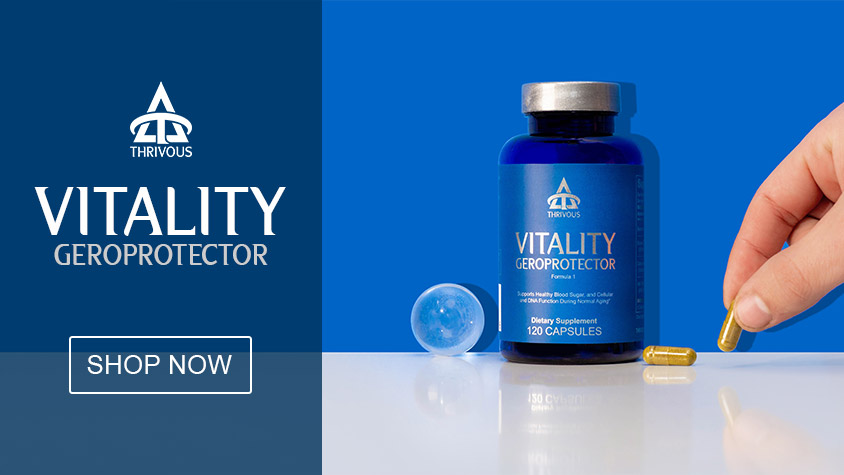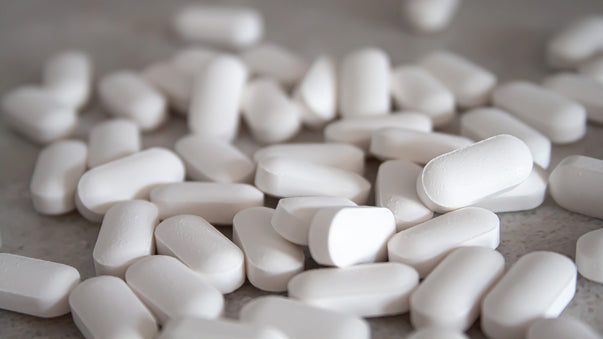Berberine Is a Promising Life Extension Treatment

Berberine is a chemical compound that has been discovered in multiple plants. Notably, it's found in the gorgeous berberis vulgaris shrub, commonly known as "barberry." Berberine has been used for thousands of years in Chinese and Ayurvedic medicine. And it has even been used, in areas like India, to dye wool and similar products.
It was not until 1917, in North America, that berberine was first isolated from medicinal plants. Today, the extract is a popular dietary supplement with many potential health benefits [1, 2]. And, more importantly, accumulating research supports the idea that berberine is a geroprotector [3], which may even extend maximum lifespan.
Before reading on, let me be clear. I'm not a medical doctor. Berberine is considered a dietary supplement. Although I'll mention some research related to disease, I don't recommend berberine as a treatment for any disease. And you should always get the advice of your primary care physician before taking supplements.
Also, after you read this article, go to the online Thrivous store to pick up your geroprotectors. Vitality Geroprotector combines berberine with two other promising life extension molecules: coenzyme Q10, and blueberry anthocyanin [32-34]. I'm proud of Thrivous for taking this initiative.
Metabolic Pathways
Intracellularly, berberine binds to many molecular targets. So there's still a lot more research to do, if we want to figure out all of the actions of berberine in our bodies [4].
Berberine is most well known for activating AMPK (AMP-activated protein kinase) [5]. This is a well-studied enzyme that likely plays a role in metabolic pathways related to longevity.
AMPK is also activated by metformin [6], a pharmaceutical drug. Berberine has been compared to and combined with metformin. And the results are impressive [7].
Berberine also influences PCSK9 (Proprotein convertase subtilisin/kexin type 9) [8]. This is an enzyme that influences cholesterol levels.
Promising Systemic Health Effects
One method to determine if a treatment has life extension potential, is to observe its effects in context of multiple body systems and functions. If treatments are helpful across contexts, it's possible that the treatment promotes systemic regeneration. And if enough systemic regeneration occurs, life extension will likely occur.
Aging is a systemic problem, which makes it particularly difficult to combat [9]. Using one treatment for a localized effect isn't enough. Maintaining the healthy function of one body system or function just means that thousands of others are ignored. So a system approach is essential to achieving life extension goals.
Geroprotectors are treatments that are well known for having system-wide effects. They are associated with impressive lists of animal and human trials that evidence beneficial effects on multiple body systems and functions.
For example, quickly type "berberine" into WebMD. They provide you with information about berberine's multifaceted health effects. They also notify you that there still needs to be more research. And that makes sense because preventing aging and extending lifespan will require a systemic approach.
Reputable articles published at places like PubMed, HealthLine, and others, provide a greater breadth of research. And they reveal the potential that geroprotectors like berberine have for systemic regeneration.
To get a quick appreciation for this, type "berberine" into clinicaltrials.gov. You will see 64 studies in total and 32 completed studies. Now look at the indications. You will see that they're related to many different body systems and functions.
Literature is accumulating in relation to berberine's ability to support healthy cholesterol and heart function, and decrease high blood pressure. A review [12], meta-analysis [13], and study [14] show that berberine is associated with multiple cardiovascular health benefits across both non-human animals and humans.
One review of about a dozen clinical studies indicates that berberine could lower total cholesterol 0.61 mmol, lower LDL cholesterol by 0.65 mmol, lower blood triglycerides by 0.50 mmol/L, and raise HDL cholesterol by 0.05 mmol/L. Impressively, it could also lower apolipoprotein B by 13 to 15 percent [11, 15]. More research is needed to determine how berberine affects heart disease.
Cautiously, I'll mention that there are in vitro and animal studies indicating that berberine may have reduced the spread of cancer in some cases [19, 20]. One review notes that berberine has “clear inhibitory effects” on colorectal cancer, lung cancer, ovarian cancer, prostate cancer, liver cancer, and cervical cancer [21]. More research is needed to determine how berberine affects cancer.
Diabetes is a highly systemic disease. Exploring anti-diabetic potential, double-blind studies of berberine have shown that it may improve insulin sensitivity and support healthy blood sugar levels. A meta-analysis observes that berberine has lowered blood sugar more than placebo [22]. For example, in a study of 116 diabetic patients, their fasting blood sugar decreased by 20%, and their hemoglobin A1c decreased by 12% [23].
Studies related to diabetes and berberine have also shown that berberine may promote weight loss. A clinical study review observed that berberine reduces weight in human subjects over a 3-month period [24]. More research is needed to determine how berberine affects type 2 diabetes mellitus.
Our nervous system is an unparalleled complex system, capable of the most beautiful and awesome functions. Berberine seems to be a promising candidate to support healthy nerve function. There are many rat and human studies that associate enhanced mood with berberine [25-28]. And berberine seems to have multiple protective effects related to the brain [25].
There's research indicating that berberine has anti-oxidant and anti-inflammatory effects [16-18]. And its systemic benefits may also reach the liver [30], ovaries [29], the immune system [31], and many other body organs and functions.
Evidence that Berberine Extends Life
Berberine has extended the lifespan of many different model organisms [34, 33]. In one study, berberine was fed to mice every day. And it extended their lifespan on average by 16%.
A 16% increase in lifespan for humans would mean that we would live a little longer than 90 years, as easily as we live up to 80 years today. But we’d probably be in better health than today’s 80-year-olds because many aspects of the aging process may also be significantly slowed or reversed.
What next? We observe life extension in model organisms. And we observe potential for systemic regeneration in humans and animals. The next step should be a direct test of how berberine affects aging in humans, perhaps replicating the TAME study [10].
Side Effects and Safe Dosage
While researching berberine, you may notice that popular articles have conflicting views of its potential side effects. The primary scientific literature, on the other hand, does not seem to be as controversial. Common side effects include cramping, diarrhea, flatulence, constipation, and stomach pain. Other than that, berberine appears to have an excellent safety profile [7].
Most human studies administer berberine to subjects at a high dose between 1000 and 1500 mg/day. Because our understanding of berberine is still improving, a good approach may be to talk to your doctor about a low dose of berberine.
That's another reason why it's good to purchase your berberine supplement from Thrivous. Each capsule of Vitality Geroprotector contains 125 mg berberine. And there's 500 mg berberine in each serving of four capsules. Other supplement brands tend to sell berberine at a much higher dose per capsule.
I also recommend that you test for and collect baseline biomarkers (cholesterol, blood pressure, etc.) before taking berberine. Then you can compare with future tests. This will help you recognize anything that gets better or worse.
Conclusion
Taking geroprotectors and having your biomarkers analyzed are excellent steps you can take right now to increase your chance of life extension. Being proactive and preventative is a new approach to health. And the sooner we get started, the better.
Remember, supplements are just one genre of promising life extension treatments! There are also life extension gene therapies [35, 36] that have extended mouse lifespan by between 30% and 50%. There are cell therapies [37, 38] that have extended mouse lifespan by up to 30%. And there are organ transplants [39, 40], drugs [41, 42], diets [43, 44], and other interesting methods [45].
We should start combing these treatments! If we combine them in the right way, there may be synergistic effects. And that may help us all live for 150 years, or even much longer.
Thrivous is great because they want to see everyone around them get healthier and live longer. Please support Thrivous. And consider donating your biomarkers to scientists who analyze the effects of geroprotectors. These are real steps that you can take to help extend our species' maximum lifespan.
I look forward to living a lot longer with you.
References
- (2013) Molecule of the Week Archive: Berberine. American Chemical Society. https://www.acs.org/content/acs/en/molecule-of-the-week/archive/b/berberine.html.
- Berry J. (2019). Everything you need to know about berberine. Medicalnewstoday. https://www.medicalnewstoday.com/articles/325798
- Moskalev A. et al. (2017). Geroprotectors: A Unified Concept and Screening Approaches. Aging and Disease. 8(3): 354–363.
- Yao J. et al. (2015). Learning From Berberine: Treating Chronic Diseases Through Multiple Targets. Sci China Life Sci. 58(9):854-9
- Lee Y. et al. (2006). Berberine, a Natural Plant Product, Activates AMP-Activated Protein Kinase With Beneficial Metabolic Effects in Diabetic and Insulin-Resistant States. Pharamcology & Therapeutics. 55(8): 2256-2264.
- Martin-Montalvo A. (2013). Metformin improves healthspan and lifespan in mice. Nature communications. 2192.
- Yin J. et al. (2009). Efficacy of Berberine in Patients with Type 2 Diabetes. Metabolism. 57(5): 712–717.
- Peter Attia. Insights about berberine (AMA #3). PeterAttiaMD. YOUTUBE. 3:38. January 23, 2020.
- 2013 definition of aging
- Barzilai N. et al. (2018). Metformin as a tool to target aging. Cell Metabolism. 23(6): 1060–1065.
- Dong H. et al. (2013). The Effects of Berberine on Blood Lipids: A Systemic Review and Meta-Analysis of Randomized Controlled Trials. Planta Med. 79(6):437-46.
- Tabeshpour J. et al. (2017). A review of the effects of Berberis vulgaris and its major component, berberine, in metabolic syndrome. Iran J Basic Med Sci. 20(5): 557–568.
- Lan J. et al. (2015). Meta-analysis of the effect and safety of berberine in the treatment of type 2 diabetes mellitus, hyperlipemia and hypertension. Journal of Ethnopharmacology. 161: 69-81.
- Guo Z. et al. (2014). Anti-hypertensive and renoprotective effects of berberine in spontaneously hypertensive rats. Clinical and Experimental Hypertension. 37(4): 332-339.
- Cicero A. et al. (2007). Eulipidemic Effects of Berberine Administered Alone or in Combination With Other Natural Cholesterol-Lowering Agents. A Single-Blind Clinical Investigation. Arzneimittelforschung. 57(1): 26-30.
- Li Z. et al. (2014). Antioxidant and Anti-Inflammatory Activities of Berberine in the Treatment of Diabetes Mellitus. Hindawi. 1-12.
- Lou T. et al. (2011). Berberine Inhibits Inflammatory Response and Ameliorates Insulin Resistance in Hepatocytes. Inflammation. 34(6): 659-67.
- Xiao, H. et al. (2012). Berberine Inhibits Dyslipidemia in C57BL/6 Mice With Lipopolysaccharide Induced Inflammation. Pharmacol Rep. 64(4): 889-95.
- Yiyi S. et al. (2009). A systematic review of the anticancer properties of berberine, a natural product from Chinese herbs. Anti-cancer drugs. 20(9): 757-769.
- Ortiz L. et al. (2014). Berberine, an Epiphany Against Cancer. Molecules. 19(8) 12349-67.
- Liu D. et al. (2019). A Natural Isoquinoline Alkaloid With Antitumor Activity: Studies of the Biological Activities of Berberine. Front Pharmacol.
- Liang Y. et al. (2019). Effects of berberine on blood glucose in patients with type 2 diabetes mellitus: a systematic literature review and a meta-analysis. Endocrine Journal. 66(1): 51-63.
- Chang W. et al. (2014). Berberine as a Therapy for Type 2 Diabetes and Its Complications: From Mechanism of Action to Clinical Studies. Biochem Cell Biol. 93(5): 479-86.
- Hu Y. et al. (2012). Lipid-lowering effect of berberine in human subjects and rats. Phytomedicine. 19(10): 861-867.
- Fan J. (2019). Pharmacological effects of berberine on mood disorders. J Cell Mol Med. 23(1): 21-28.
- Kulkarni S. and Dhir A. (2008). On the Mechanism of Antidepressant-Like Action of Berberine Chloride. Eur J Pharmacol. 589(1-3):163-72.
- Peng W. et al. (2007). Berberine Produces Antidepressant-Like Effects in the Forced Swim Test and in the Tail Suspension Test in Mice. Life Sci. 81(11):933-8.
- Lee B. et al. (2007). Inhibitory Effects of Coptidis Rhizoma and Berberine on Cocaine-induced Sensitization. Evid Based Complement Alternat med. 6(1):85-90.
- Li M. et al. (2018). The Effect of Berberine on Polycystic Ovary Syndrome Patients with Insulin Resistance (PCOS-IR): A Meta-Analysis and Systematic Review. Hindawi. 1-8.
- Liu Y. et al. (2013). Update on Berberine in Nonalcoholic Fatty Liver Disease.
- Cernáková M. and Kostálová D. (2002). Antimicrobial Activity of Berberine--A Constituent of Mahonia Aquifolium. Folia Microbiol (Praha). 47(4):375-8.
- Quiles J. et al. (2004). Coenzyme Q Supplementation Protects From Age-Related DNA Double-Strand Breaks and Increases Lifespan in Rats Fed on a PUFA-rich Diet. Exp Gerontol. 39(2):189-94.
- Navrotskaya VV, Oxenkrug G, Vorobyova LI, Summergrad P (2012). Berberine Prolongs Life Span and Stimulates Locomotor Activity of Drosophila melanogaster. Am J Plant Sci, 3:1037-1040.
- Dang Y. et al. (2019). Berberine ameliorates cellular senescence and extends the lifespan of mice via regulating p16 and cyclin protein expression. Aging Cell. 19(1).
- Kano Y. et al. (2019). C-SH2 point mutation converts p85β regulatory subunit of phosphoinositide 3-kinase to an anti-aging gene. Nature.
- Thanos P. et al. (2016). Dopamine D2 gene expression interacts with environmental enrichment to impact lifespan and behavior. Oncotarget. 7(15):19111-23.
- Kim D. et al. (2015). Health Span‐Extending Activity of Human Amniotic Membrane‐ and Adipose Tissue‐Derived Stem Cells in F344 Rats. Stem cells journal. 4(10).
- Zhang Y. et al. (2017). Hypothalamic stem cells control ageing speed partly through exosomal miRNAs. Nature. 548: 52-57.
- Habermehl T. et al. (2019). Extension of longevity and reduction of inflammation is ovarian-dependent, but germ cell-independent in post-reproductive female mice. Geroscience. 41(1):25-38
- Pierpaoli W. et al. (1997). Circadian melatonin and young-to-old pineal grafting postpone aging and maintain juvenile conditions of reproductive functions in mice and rats. Exp Gerontol. 32(4-5):587-602.
- Smith B. et al. (2019). Changes in the gut microbiome and fermentation products concurrent with enhanced longevity in acarbose-treated mice. BMC Microbiol. 19(1):130.
- Ko K. et al. (2010). Long-Term Dietary Supplementation with a Yang-Invigorating Chinese Herbal Formula Increases Lifespan and Mitigates Age-Associated Declines in Mitochondrial Antioxidant Status and Functional Ability of Various Tissues in Male and Female C57BL/6J Mice. Rejuvenation Res. 13(2-3):168-71.
- Roberts M. et al. (2018). A ketogenic diet extends longevity and healthspan in adult mice. Cell Metab. 26(3): 539–546.e5.
- Solon-Biet S. et al. (2014). The ratio of macronutrients, not caloric intake, dictates cardiometabolic health, aging, and longevity in ad libitum-fed mice. Cell Metab. 19(3):418-30.
- McMurphy T. et al. (2018). Implementation of environmental enrichment after middle age promotes healthy aging. Aging. 10(7):1698-1721.
More Articles
Read more articles at Thrivous, the human enhancement company. You can browse recent articles in Thrivous Views. See other Geroprotectors or Product Ingredient articles. Or check out an article below.
-
Wear Those Masks
Yesterday, our swimming pool reopened after four months. All over the world, COVID-19 lockdown measures are being eased. This is ...
-
Dexamethasone Improves Survival in COVID-19
The low-dose steroid treatment dexamethasone is a major breakthrough in the fight against the deadly virus, COVID-19. This is according ...



